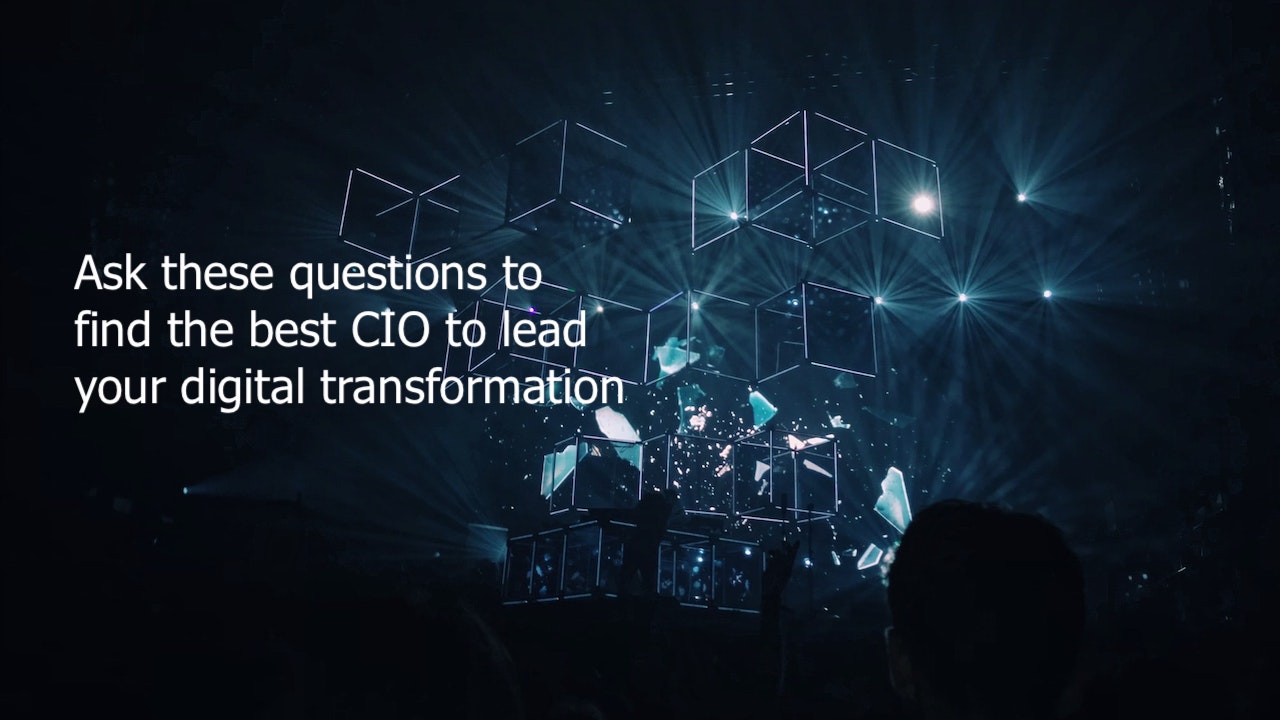18 CIO Interview Questions

The demand for agile and transformational Chief Information Officers (CIOs) is exploding as organizations progress evermore aggressively into the digital frontier. It's common wisdom that ‘all business is technology business’ and CIOs play a critical role in digital transformation.
With such high stakes, many senior executives and department leaders have struggled to come up with illuminating CIO interview questions to gain insight into each candidate’s attitude and approach to technology leadership, as well as whether or not the prospective C-suite colleague would mesh with the general vibe of the organization.
These CIO hiring and recruitment challenges are compounded by the evolving and multifaceted role of these digital frontrunners.
Below, we’ll look at the most insightful CIO interview questions that you should ask (and why) based on agreed-upon insight from veteran CIOs, executive advisors, and Certified Association Executives (CAE).
Let’s first do a quick high-level run-through of what to look for when recruiting and interviewing potential CIO candidates for your association.
CIO Qualifications and Hiring Process
Role and Responsibilities
As senior technology executives in the digital leadership hierarchy, CIOs are tasked with accelerating IT’s value across departments, translating how digital can change the game, and mapping out the connection between emergent technology and organizational impact.
The CIO position is truly the linchpin to driving your association’s digital transformation and competitive IT strategy forward.
In fact, the largest IT leadership survey in the world, Harvey Nash / KPMG CIO Survey, found that 61% of CIOs indicate that the pandemic has increased their influence and 97% are zeroed in on changing digitally as we speak.
Desired Career Path & Background
While the career roadmap isn’t exactly linear, most CIOs have a background in both IT and business.
IT recruitment firm Harvey Nash estimates that about 70% of CIOs come from a tech background, 5% from a pure business background, and 25% from areas close to IT (e.g. operations, change management, and transformation).
But the truth is, even CIOs with heavy tech backgrounds have incredibly strong business skills. Some may have even held business-facing roles in the past.
Regardless of career trajectory, what’s important is that CIO candidates have the technical and soft skills to guide your organization through escalating expectations and market pressures to digitally transform.
Ideally, you want a multifaceted technology leader who is deeply passionate about emerging technologies and industry trends. The right CIO for your association should have the experience and know-how to drive tech strategy forward and increase your association’s digital literacy and operational efficiency.
Decision-Makers in the CIO Interview Process
Typically, the hiring team that interviews CIO prospects consists of the CEO and other C-level execs, chief HR officers, and occasionally members of the board of directors.
Conducting several rounds of one-on-one and roundtable-style interviews is standard in the CIO hiring process.

18 Intelligent CIO Interview Questions
Here is a round-up of the most important CIO questions to ask during an interview to gauge the candidate’s skills, philosophies, and whether they're the best fit for the role.
These are the questions that your selected technology executive will inevitably have to contend with in order to cement your association’s foothold in the industry and stimulate the kind of organizational hustle you need in the age of digital disruption.
Question #1 – How should our association evolve to keep up with digital technology?
During this time of exponential change, your organization needs a forward-looking, business-minded digital leader who can rally a transformational spirit in the collective and create a culture of innovation through IT leadership.
Prospective CIOs should answer this interview question by discussing how they would remove barriers and encourage the speedy adoption of technology implementations and infrastructure upgrades.
Potential CIO candidates should know how to develop roadmaps on how your association can leverage IT to achieve core objectives, organizational seamlessness, and continuous process improvement.
Candidates should be able to explain what’s necessary to integrate digital technology into all areas of your association and fundamentally change how you operate and deliver value to members.
Essentially, the CIO interviewee should explain how they would position your association to pivot and scale into new opportunities and minimize internal resistance to transformational, value-added technologies and process innovations.
Question #2 – What would you say are the top two ingredients to the success of a CIO?
Put a gold star next to CIO candidates who can cover these two cornerstones of CIO success:
- The ability to simplify tech talk, advise other C-level executives, and essentially be the tech-whisperer.
- Viewing positive, transformational change as a series of strategic steps.
Why? 70% of digital transformations fail. The reason? Poor communication and change management. Instead of scheduling regular performance-management discussions to track progress, you get resistance and misalignment across departments.
You need a CIO who is committed to continuous process improvement. One who can establish the right change-management infrastructure for effective iteration, a cadence of leadership-oversight meetings, and a “transformation office” to improve communication and control the implementation process.
Yes, there are tons of other important qualities of a high-performing CIO as shown in the graphic below. However, prospective CIOs should hone tech translation and change management through continuous process improvement.
Question #3 – How would you use IT to scale our value propositions?
Put CIO candidates on the shortlist if they discuss the need to transmute operational value creation, organizational culture, and your sense of purpose in the digital age.
Radically reframing the meaning and value of your association in the context of the ever-changing digital world will allow you to deliver (and continuously scale) disruptive value propositions to advance the professions you represent, members’ interests, and community advocacy.
Take note of CIO candidates that can then execute a transformative strategic plan through effective value stream management. This means mapping your organization's value streams to key capabilities, then to your IT processes, and finally to an actionable IT strategy roadmap. You want these tech disruptors on your team and to be moved up to the next round of the CIO interview process.
Question #4 – How would you use IT to create more revenue streams for our organization?
CIO interviewees should be able to walk you through how to:
- Plug your existing intellectual property and proprietary information into a digital interface to create new data-driven revenue streams
- Use predictive modeling to turn member data into profit.
- Think unconventionally about non-dues product innovations.
Ultimately, you want to hire a CIO who has a cutting-edge yet validated view of your organizational capabilities and how to square those up with your strategic initiatives, investments, and strategy is a necessity in order to be a competitive industry player.
In an era of digital disruption, the CIO of professional associations must go the extra mile to challenge the status quo, disrupt the pre-pandemic organizational model, and continually take a methodical, long-haul approach to experimentation.
For example, at Cimatri we realized the value in partnering with a diverse network of mission-driven organizations to offer our clients a broader range of IT services. Some professional membership associations have even transformed their business model to keep up to date with technological advances by forging alliances with competitors.
During the interview process, take note of CIO candidates who highlight the importance of building such strategic relationships and redirecting to more purpose-driven IT investing approaches.
That is the kind of technology executive you should bring into the fold of your C-suite team to amplify your impact, deliver even greater value to your members, and meet the needs of the post-pandemic digital world with greater agility.
Question #5 – What’s the difference between digitizing and digital transformation?
The CIO you hire should have a deep understanding of the difference between digitizing and digital transformation in order to truly transform your association into a resilient organization.
It’s not enough to just digitize what your member-based organization has been doing. In order to future-proof membership, you can’t simply enable staff to work remotely within the boundaries of your pre-COVID organizational model.
Instead, the CIO candidate you’re interviewing and vetting should describe how they would differentiate your professional association from competitors and foster success.

Question #6 – Which areas would you focus on now and in the coming years?
The way candidates answer this question gives you insight into what they think will set them up for success and their top priorities as the CIO of your association.
The focus should really revolve around three key innovation initiatives: 1) fixing the service desk, 2) agile strategy and execution roadmaps, and 3) IT architecture and management.
Also, the function and priorities of the CIO will likely be shaped by unique economic recovery patterns and the need to act decisively in the years ahead. So, be sure to ask CIO candidates about their approach to these external factors as it relates to your association in particular.
Question #7 – How would you balance incremental and disruptive innovation?
Balancing and focusing on both transformative initiatives and improving existing operations is critical.
So the CIO, as the innovation leader handling transformative initiatives, needs to demonstrate how they would communicate the rationale for the change and work with IT operations to maintain this balance.
Question #8 – How do you establish clear IT priorities that everybody can get behind?
The CIO’s technology strategy and execution is essential to ensure all departments and staff understand and further IT priorities and digital changes as part of the overall organization strategy.
Candidates should discuss how they would adopt and refine your operating model to make your organization more adaptable. This model should instill a growth mindset to unlock change and thrive regardless of circumstance.
Be sure to ask how this agile strategy will establish clear, straightforward accountability.
Question #9 – How would you work with stakeholders to ensure satisfaction and that IT is delivering what they need?
The responses you get to this question in the CIO interview process will give you vital insight into their business technology strategy, as well as their processes for communicating across divisions and managing stakeholder relationships. It also taps into their change management expertise and other vital CIO skills, processes, and structures.
Question #10 – Should you adapt processes to technology or vice versa?
To transform digitally and implement new products and services that provide value to your members, you must start with the strategy and let IT follow.
CIO interviewees should talk about how transformation isn’t really about technology, but rather it’s a fundamental culture change at the organizational and process level.
It’s about aligning your people, processes, and technology behind the strategy.
This includes synchronizing IT organizational design with that same IT and overall strategy.
Question #11 – Explain how you navigated your organization and shifted tech priorities through the pandemic?
COVID-19 was a disruptive catalyst that forcibly launched professional associations into accelerated digital transformation and the adoption of nascent technologies.
The principal obstacles that many organizations had to overcome during the pandemic involved remote work implementations. Many go-to discussions during the CIO interview process will likely cover this topic and how the CIO candidate was able to get their team up and running at home with access to everything they needed.
41% of organizations say cybersecurity incidents have increased since COVID, especially spear phishing and malware attacks. This growth is largely due to remote work and inadequate internal education on risk protection.
Many CIOs chose to leverage outsourced or managed services (i.e. business-managed IT) to safeguard systems and data from attacks. This shift is expected to mature going forward.

Strong CIO candidates should tell you about their initiatives or processes for staff education and continued awareness to keep cyber risks at bay.
Ideally, the best CIOs should have already had a strategic plan in place to navigate the transition to remote work quickly and easily.
Question #12 – How would you plan ahead for potential disruptions down the road?
During the interview process, watch out for CIO prospects that display a deep understanding of the best practices for strategic workplace planning including the technology and cost implications around having a distributed workforce.
Going forward, IT strategy and budgets will likely shift to include distributed work implementations and long-term workplace planning.
The CIOs you interview should know that short-term planning isn't strategic in driving an organization forward. The massive COVID disruption is proof.
Prospective CIOs should discuss, on a strategic level, your organization’s pathway to economic recovery from potential sources of disruption down the line.
Ask them to walk you through the specifics of that recovery pathway and how it would help you emerge even more competitive going forward.
CIO candidates should also describe how they would build a culture of innovation and continuous process improvement to mature digitally and increase organizational agility.
Automation and predictive analytics is also a massive part of reducing the impact of future disruptions.
Question #13 – What are the keys to successful IT investments?
Firstly, CIO candidates should respond by discussing the technology and business initiatives that will drive IT investment. Their response should describe their approach to building highly specific investment cases that support your core organizational goals.
Secondly, strong CIO prospects should know the value of investing in smaller, more frequent experiments that allow you to demonstrate potential value.
Instead of funding big technology projects or a new software platform, true digital leaders are adopting healthy approaches to smaller “dynamic investments” and business-managed IT investments.
With these small, modular IT investments, you can ditch the tech if the results miss the mark or the business needs changes. This way you’re not stuck with a bunch of technical debt. You can also source the right skills to fulfill these types of investments.
Business-managed technology investments are part of an overall organizational trend in which demonstrating business value and results are paramount. This smaller, modular IT investment strategy is likely to mature going forward because it solves the challenges of the balancing act between managing cost with increasing performance.
These technology investments also get IT and business functioning together, which results in improved member and business outcomes, lower risk, and quicker innovation.
Thirdly, technology spending should also depend on how the CIO plans to respond to the external forces shaping their technology plans. Ask the candidate about their ability to pivot in the face of disruption.
Question #14 – What are the main challenges facing CIOs and how would you overcome them?
Draw a spotlight on CIO candidates who discuss any obstructions to the simplicity and clarity of business goals, strategic decisions, and cross-departmental alignment.
Interviewees should also discuss IT skills shortages. For the first time in its 22-year history, the Harvey Nash / KPMG CIO Survey indicates that cyber-security expertise has become the most in-demand skill set, especially in the cloud and data security space, largely because of the shift to remote work and the nuances of supporting a distributed workforce.
To solve this problem, more and more associations are outsourcing to a certified IT consultant. In particular, CIOs and IT leaders are hiring outside IT specialists and then automating as much as they can in-house.
Strong CIO candidates may also provide a high-level view of how they would manage technical debt and the common technology problems impacting associations.
However, CIO candidates should understand the importance of delegating these IT operations processes to the IT director or manager so the CIO can focus on change initiatives.

Question #15 – Describe your ideal organizational culture and what role IT should play in shaping that culture?
Of course, it’s equally important for interviewers to determine whether a prospective CIO is a good match for your organization’s culture and mission.
Asking culture-related questions can give you insight into why CIO interviewees really want to work for your association, the type of organizational culture they thrive in, and how they would develop an innovation culture.
Question #16 – Can you walk me through your current succession plan?
CIO candidates should be able to detail the succession plan for their current role.
Having an efficient strategy and process for passing on their current leadership role indicates a strong IT leader who looks to the future and how to best preserve business continuity during inevitable times of transition.
Question #17 – How would IT promote diversity and inclusion?
Diverse teams promote better organizational performance.
The Harvey Nash / KPMG CIO Survey found that more than two-thirds of IT teams feel that being diverse improves trust, collaboration, and skill development. Yet only 24% feel that their technology team is successful at promoting diversity and inclusion (D&I) in the workplace.
So ask CIO candidates if they’ve ever led a multicultural / multi-generational team and how they would approach D&I in the staff hiring and development process.
Question #18 – How do you vet and retain new employees?
Their approach to hiring and retention of IT talent will help both interviewees and you as the interviewer understand how well your values and organizational visions are aligned and, ultimately, how well you’ll work together to move the needle forward.
The way CIO candidates respond gives you further insight into their approach to leadership and staff development. Their response should touch on ways to avoid turnover and promote retention.
Answers should also delve into detail on how the prospective CIO candidate would advance vital skills of their IT team and encourage an environment where IT staff are always learning from each other..
Are you ready to put a CIO on your team?
If your association doesn’t have a CIO, it might be time to hire one, or to hire a virtual CIO.
Cimatri is famous in the association industry for our virtual CIO and CIO coaching services.
Let's talk about the next steps to take your association’s technology leadership to new heights in the digital age.



